On a makeshift stage in The Gambia, a small West African nation, a dozen women sing to an enthusiastic crowd. The audience claps along, moving to the beat. But the songs are not joyful celebrations of love or salvation. They are educational, providing information about malaria prevention and childhood immunizations and treatment options for HIV/AIDS. The practical information, engagingly delivered, saves lives.
“In the U.S., we have more of a distinction between entertainment and serious information and the two don’t cross much,” says ethnomusicologist Bonnie McConnell, a doctoral student in the School of Music. “In The Gambia there is more of an acceptance that the role of musicians is also to educate.” McConnell explores this role in her dissertation, “Singing the Unsayable: Women’s Music Performance and Health in The Gambia.”
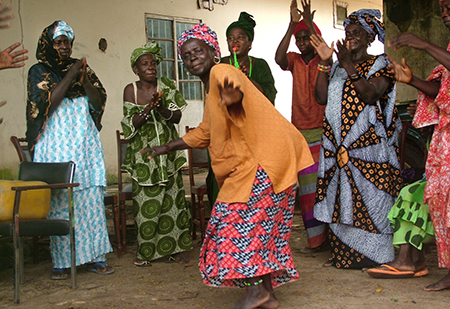
McConnell’s research is in a subfield of ethnomusicology known as medical ethnomusicology, which explores the intersection of music and health. “Global health initiatives tend to focus on what is lacking in poorer countries rather than what is working,” she explains. “Medical ethnomusicology has the potential to shift that to a strength-based approach. We look at local culture as a resource. We try to build responses to health problems based on local cultural realities and resources rather than outside agendas.’’
McConnell first spent time in Africa as a Peace Corps volunteer. She was assigned to Tanzania, then renewed for two more years in The Gambia, where she volunteered with an HIV/AIDS support group. As a lifelong musician, she played and performed with local groups throughout her stay, but she didn’t fully appreciate the power of music to educate until an HIV-positive singer joined the support group. The singer, initially devastated by her HIV diagnosis, felt empowered by the support. She sought proactive treatment, her health improved dramatically, and she wanted to share what she’d learned. “She felt that there were a lot of misconceptions about HIV and AIDS that prevented people from getting tested and prevented people living with the disease from getting the support and care they needed,” recalls McConnell.
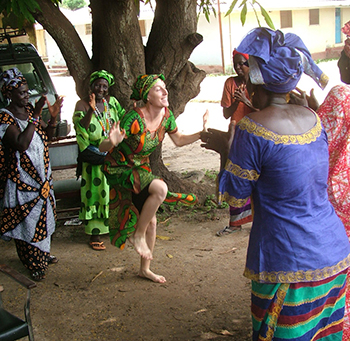
The singer wrote six songs addressing HIV prevention, support, and care, which led to an album and music videos produced with McConnell’s help. The music received considerable air play through local radio and television outlets, and McConnell heard many anecdotes about its effectiveness. One came from a Gambian friend who shared the music DVD with a neighbor whose husband had a lingering illness. She hoped the songs would motivate the husband to get tested for HIV—and it worked. “My friend said she’s done this on multiple occasions,” says McConnell. “It’s a subtle but very effective way to educate people.”
We look at local culture as a resource. We try to build responses to health problems based on local cultural realities and resources rather than outside agendas.
Seeing firsthand how music could boost health education, McConnell decided to explore the topic further as a UW doctoral student. (McConnell also earned a UW graduate certificate in public health in 2010.) The main focus of her dissertation is kanyeleng groups in The Gambia—performance groups composed of women who have experienced infertility or child mortality. In the past two decades, kanyeleng groups have broadened their scope, welcoming all women (and even a few men) and taking on a wide range of health topics in their music.
“One of the things that makes the kanyeleng groups particularly skilled at communicating health information is their willingness to address sensitive topics,” says McConnell. “They aren’t afraid to talk about sexually transmitted diseases or genital cutting or other topics that others would shy away from. They like to say that kanyeleng buka malu, which means that kanyeleng performers don’t have any shame. In music there’s also what I call ‘performative license’—the ability to say certain things within a performance context that you might not be able to say elsewhere.”
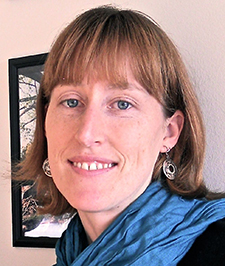
Kenyeleng groups pair that outspoken attitude with a performing style that encourages audience participation, from clapping and dancing to singing along. “This can help people remember information more effectively or feel more engaged with what’s going on, in contrast to an event where you have someone just lecturing at you,” says McConnell.
With support from a Fulbright Hayes Fellowship, McConnell spent 16 months in The Gambia in 2012-2013 doing fieldwork, much of it in collaboration with The Gambia’s Ministry of Education and several NGOs. She observed and participated in kanyeleng and other musical performances, health education events, women’s group events, and HIV/AIDS support group activities. She also conducted interviews with 130 performers, health care workers, and people living with HIV/AIDS. She hopes her dissertation, supported through an American Association of University Women fellowship, will encourage greater appreciation of the valuable role of women and music in health care awareness.
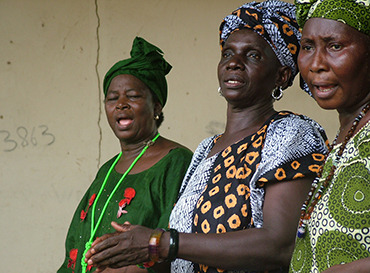
“Women performers’ role in health promotion has not been adequately studied in The Gambia,” says McConnell. “There tends to be more focus on male performers, but women are the ones who have used music to break down barriers and address sensitive health issues. They are doing important work.”
More Stories

Bringing Music to Life Through Audio Engineering
UW School of Music alum Andrea Roberts, an audio engineer, has worked with recording artists in a wide range of genres — including Beyoncé.

A Healing Heart Returns
In February, the UW Symphony will perform a symphony that Coast Salish elder Vi Hilbert commissioned years ago to heal the world after the heartbreak of 9/11. The symphony was first performed by the Seattle Symphony in 2006.
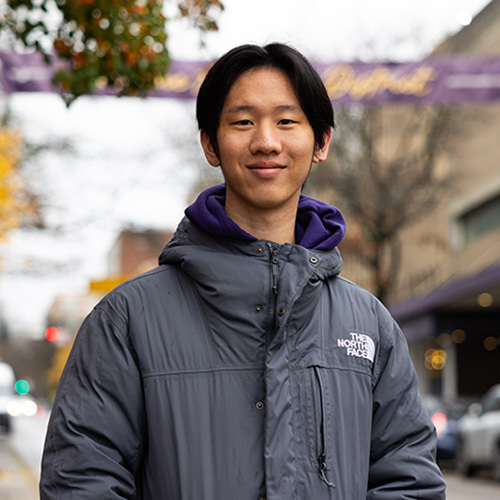
The Public Impact of Private Cities
Geography major Edwin Bai has researched private cities, developed by individuals and corporations, that "take the libertarian idea of low government regulation to the maximum."